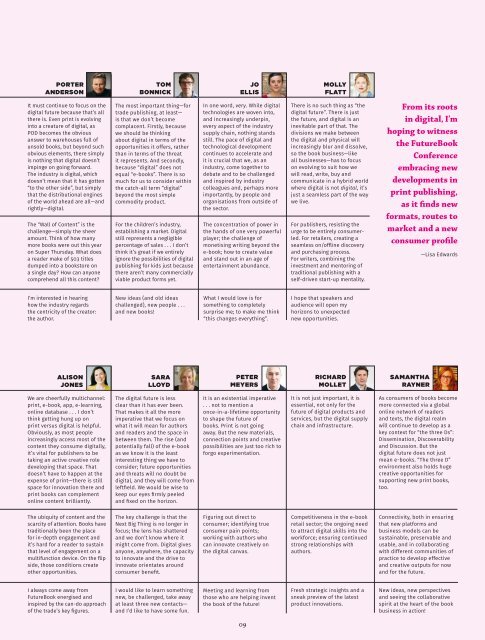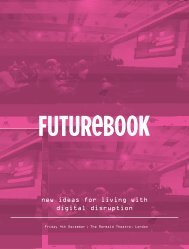FutureBook 05.11.15
Create successful ePaper yourself
Turn your PDF publications into a flip-book with our unique Google optimized e-Paper software.
PORTER<br />
ANDERSON<br />
TOM<br />
BONNICK<br />
JO<br />
ELLIS<br />
MOLLY<br />
FLATT<br />
It must continue to focus on the<br />
digital future because that’s all<br />
there is. Even print is evolving<br />
into a creature of digital, as<br />
POD becomes the obvious<br />
answer to warehouses full of<br />
unsold books, but beyond such<br />
obvious elements, there simply<br />
is nothing that digital doesn’t<br />
impinge on going forward.<br />
The industry is digital, which<br />
doesn’t mean that it has gotten<br />
“to the other side”, but simply<br />
that the distributional engines<br />
of the world ahead are all—and<br />
rightly—digital.<br />
The “Wall of Content” is the<br />
challenge—simply the sheer<br />
amount. Think of how many<br />
more books were out this year<br />
on Super Thursday. What does<br />
a reader make of 503 titles<br />
dumped into a bookstore on<br />
a single day? How can anyone<br />
comprehend all this content?<br />
The most important thing—for<br />
trade publishing, at least—<br />
is that we don’t become<br />
complacent. Firstly, because<br />
we should be thinking<br />
about digital in terms of the<br />
opportunities it offers, rather<br />
than in terms of the threat<br />
it represents. And secondly,<br />
because “digital” does not<br />
equal “e-books”. There is so<br />
much for us to consider within<br />
the catch-all term “digital”<br />
beyond the most simple<br />
commodity product.<br />
For the children’s industry,<br />
establishing a market. Digital<br />
still represents a negligible<br />
percentage of sales . . . I don’t<br />
think it’s great if we entirely<br />
ignore the possibilities of digital<br />
publishing for kids just because<br />
there aren’t many commercially<br />
viable product forms yet.<br />
In one word, very. While digital<br />
technologies are woven into,<br />
and increasingly underpin,<br />
every aspect of the industry<br />
supply chain, nothing stands<br />
still. The pace of digital and<br />
technological development<br />
continues to accelerate and<br />
it is crucial that we, as an<br />
industry, come together to<br />
debate and to be challenged<br />
and inspired by industry<br />
colleagues and, perhaps more<br />
importantly, by people and<br />
organisations from outside of<br />
the sector.<br />
The concentration of power in<br />
the hands of one very powerful<br />
player; the challenge of<br />
monetising writing beyond the<br />
e-book; how to create value<br />
and stand out in an age of<br />
entertainment abundance.<br />
There is no such thing as “the<br />
digital future”. There is just<br />
the future, and digital is an<br />
inevitable part of that. The<br />
divisions we make between<br />
the digital and physical will<br />
increasingly blur and dissolve,<br />
so the book business—like<br />
all businesses—has to focus<br />
on evolving to suit how we<br />
will read, write, buy and<br />
communicate in a hybrid world<br />
where digital is not digital, it’s<br />
just a seamless part of the way<br />
we live.<br />
For publishers, resisting the<br />
urge to be entirely consumerled.<br />
For retailers, creating a<br />
seamless on/offline discovery<br />
and purchasing process.<br />
For writers, combining the<br />
investment and mentoring of<br />
traditional publishing with a<br />
self-driven start-up mentality.<br />
From its roots<br />
in digital, I’m<br />
hoping to witness<br />
the <strong>FutureBook</strong><br />
Conference<br />
embracing new<br />
developments in<br />
print publishing,<br />
as it finds new<br />
formats, routes to<br />
market and a new<br />
consumer profile<br />
—Lisa Edwards<br />
I’m interested in hearing<br />
how the industry regards<br />
the centricity of the creator:<br />
the author.<br />
New ideas (and old ideas<br />
challenged), new people . . .<br />
and new books!<br />
What I would love is for<br />
something to completely<br />
surprise me; to make me think<br />
“this changes everything”.<br />
I hope that speakers and<br />
audience will open my<br />
horizons to unexpected<br />
new opportunities.<br />
ALISON<br />
JONES<br />
SARA<br />
LLOYD<br />
PETER<br />
MEYERS<br />
RICHARD<br />
MOLLET<br />
SAMANTHA<br />
RAYNER<br />
We are cheerfully multichannel:<br />
print, e-book, app, e-learning,<br />
online database . . . I don’t<br />
think getting hung up on<br />
print versus digital is helpful.<br />
Obviously, as most people<br />
increasingly access most of the<br />
content they consume digitally,<br />
it’s vital for publishers to be<br />
taking an active creative role<br />
developing that space. That<br />
doesn’t have to happen at the<br />
expense of print—there is still<br />
space for innovation there and<br />
print books can complement<br />
online content brilliantly.<br />
The digital future is less<br />
clear than it has ever been.<br />
That makes it all the more<br />
imperative that we focus on<br />
what it will mean for authors<br />
and readers and the space in<br />
between them. The rise (and<br />
potentially fall) of the e-book<br />
as we know it is the least<br />
interesting thing we have to<br />
consider; future opportunities<br />
and threats will no doubt be<br />
digital, and they will come from<br />
leftfield. We would be wise to<br />
keep our eyes firmly peeled<br />
and fixed on the horizon.<br />
It is an existential imperative<br />
. . . not to mention a<br />
once-in-a-lifetime opportunity<br />
to shape the future of<br />
books. Print is not going<br />
away. But the new materials,<br />
connection points and creative<br />
possibilities are just too rich to<br />
forgo experimentation.<br />
It is not just important, it is<br />
essential, not only for the<br />
future of digital products and<br />
services, but the digital supply<br />
chain and infrastructure.<br />
As consumers of books become<br />
more connected via a global<br />
online network of readers<br />
and texts, the digital realm<br />
will continue to develop as a<br />
key context for “the three Ds”:<br />
Dissemination, Discoverability<br />
and Discussion. But the<br />
digital future does not just<br />
mean e-books. “The three D”<br />
environment also holds huge<br />
creative opportunities for<br />
supporting new print books,<br />
too.<br />
The ubiquity of content and the<br />
scarcity of attention. Books have<br />
traditionally been the place<br />
for in-depth engagement and<br />
it’s hard for a reader to sustain<br />
that level of engagement on a<br />
multifunction device. On the flip<br />
side, those conditions create<br />
other opportunities.<br />
The key challenge is that the<br />
Next Big Thing is no longer in<br />
focus; the lens has shattered<br />
and we don’t know where it<br />
might come from. Digital gives<br />
anyone, anywhere, the capacity<br />
to innovate and the drive to<br />
innovate orientates around<br />
consumer benefit.<br />
Figuring out direct to<br />
consumer; identifying true<br />
consumer pain points;<br />
working with authors who<br />
can innovate creatively on<br />
the digital canvas.<br />
Competitiveness in the e-book<br />
retail sector; the ongoing need<br />
to attract digital skills into the<br />
workforce; ensuring continued<br />
strong relationships with<br />
authors.<br />
Connectivity, both in ensuring<br />
that new platforms and<br />
business models can be<br />
sustainable, preservable and<br />
usable, and in collaborating<br />
with different communities of<br />
practice to develop effective<br />
and creative outputs for now<br />
and for the future.<br />
I always come away from<br />
<strong>FutureBook</strong> energised and<br />
inspired by the can-do approach<br />
of the trade’s key figures.<br />
I would like to learn something<br />
new, be challenged, take away<br />
at least three new contacts—<br />
and I’d like to have some fun.<br />
Meeting and learning from<br />
those who are helping invent<br />
the book of the future!<br />
Fresh strategic insights and a<br />
sneak preview of the latest<br />
product innovations.<br />
New ideas, new perspectives<br />
and seeing the collaborative<br />
spirit at the heart of the book<br />
business in action!<br />
09



